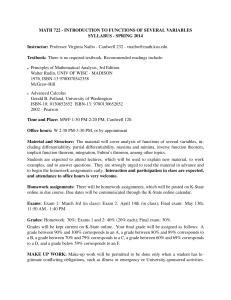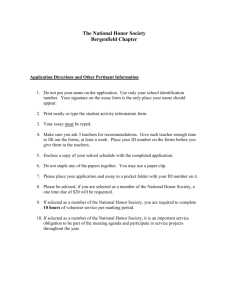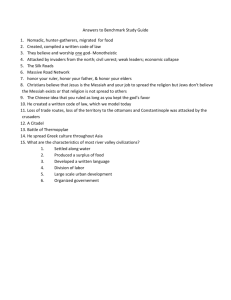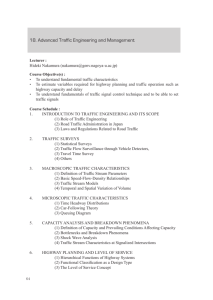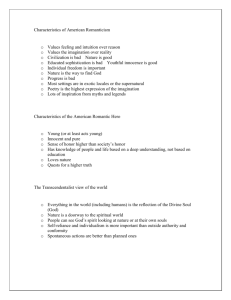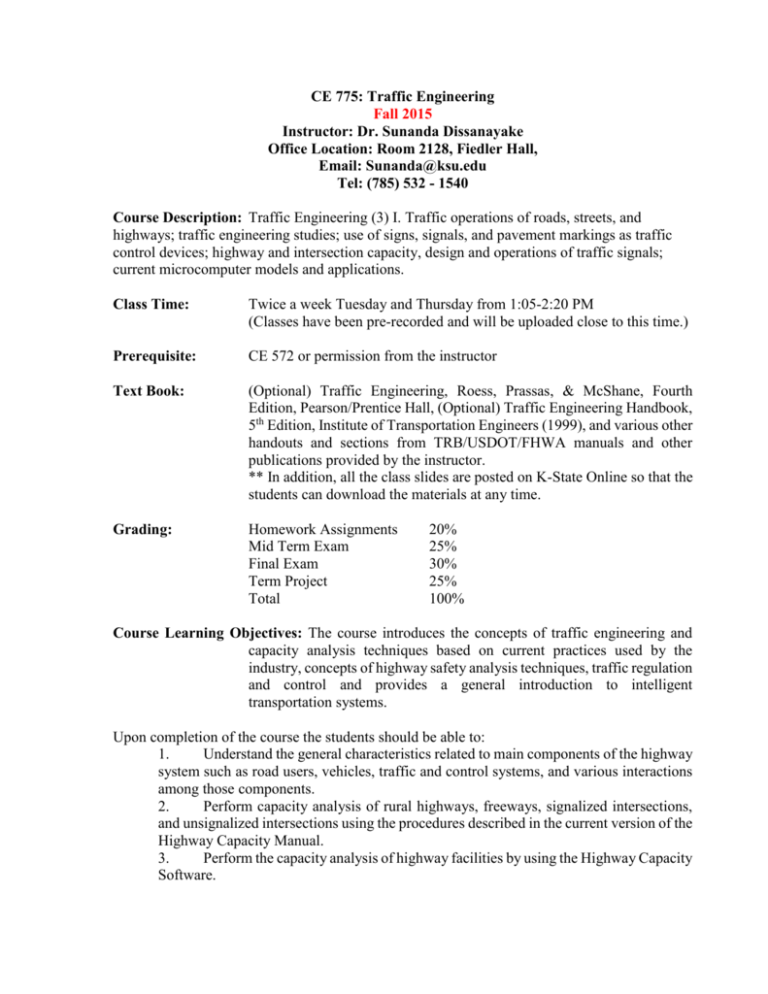
CE 775: Traffic Engineering
Fall 2015
Instructor: Dr. Sunanda Dissanayake
Office Location: Room 2128, Fiedler Hall,
Email: Sunanda@ksu.edu
Tel: (785) 532 - 1540
Course Description: Traffic Engineering (3) I. Traffic operations of roads, streets, and
highways; traffic engineering studies; use of signs, signals, and pavement markings as traffic
control devices; highway and intersection capacity, design and operations of traffic signals;
current microcomputer models and applications.
Class Time:
Twice a week Tuesday and Thursday from 1:05-2:20 PM
(Classes have been pre-recorded and will be uploaded close to this time.)
Prerequisite:
CE 572 or permission from the instructor
Text Book:
(Optional) Traffic Engineering, Roess, Prassas, & McShane, Fourth
Edition, Pearson/Prentice Hall, (Optional) Traffic Engineering Handbook,
5th Edition, Institute of Transportation Engineers (1999), and various other
handouts and sections from TRB/USDOT/FHWA manuals and other
publications provided by the instructor.
** In addition, all the class slides are posted on K-State Online so that the
students can download the materials at any time.
Grading:
Homework Assignments
Mid Term Exam
Final Exam
Term Project
Total
20%
25%
30%
25%
100%
Course Learning Objectives: The course introduces the concepts of traffic engineering and
capacity analysis techniques based on current practices used by the
industry, concepts of highway safety analysis techniques, traffic regulation
and control and provides a general introduction to intelligent
transportation systems.
Upon completion of the course the students should be able to:
1.
Understand the general characteristics related to main components of the highway
system such as road users, vehicles, traffic and control systems, and various interactions
among those components.
2.
Perform capacity analysis of rural highways, freeways, signalized intersections,
and unsignalized intersections using the procedures described in the current version of the
Highway Capacity Manual.
3.
Perform the capacity analysis of highway facilities by using the Highway Capacity
Software.
4.
Understand highway safety related issues, calculate and interpret highway crash
frequencies and rates, perform the methods to identify critical highway locations, and
suggest applicable countermeasures.
5.
Perform the common traffic engineering studies, analyze the data and extract the
necessary information needed for general traffic engineering practice.
6.
Understand and apply the applications of traffic control devices (signs, signals,
and pavement markings) based on the guidelines provided in the most current version of
the Manual on Uniform Traffic Control Devices.
7.
Understand the general concepts related to intelligent transportation systems.
An outline of the major topics to be covered in the course and a general exam and term project
schedule is as follows.
Road User and Vehicular Characteristics
Traffic Motion and Flow Characteristics
(Term Project Introduction)
Capacity Analysis Concepts
Traffic Capacity Analysis –Freeways and Rural Highways
Traffic Capacity Analysis – Signalized Intersections
(Mid Term Exam)
Traffic Capacity Analysis –Unsignalized Intersections
Capacity Analysis using HCS
Traffic Engineering Studies
Traffic Safety Analyses
Traffic Regulation and Control including Traffic Calming
Introduction to Intelligent Transportation Systems
(Final Exam, Term Papers Due)
Other Information
1. Statement Regarding Academic Honesty
Kansas State University has an Honor and Integrity System based on personal integrity, which
is presumed to be sufficient assurance that, in academic matters, one's work is performed
honestly and without unauthorized assistance. Undergraduate and graduate students, by
registration, acknowledge the jurisdiction of the Honor and Integrity System. The policies and
procedures of the Honor and Integrity System apply to all full and part-time students enrolled in
undergraduate and graduate courses on-campus, off-campus, and via distance learning. The
Honor and Integrity System website can be reached via the following URL: www.kstate.edu/honor. A component vital to the Honor and Integrity System is the inclusion of the
Honor Pledge which applies to all assignments, examinations, or other course work undertaken
by students. The Honor Pledge is implied, whether or not it is stated: "On my honor, as a
student, I have neither given nor received unauthorized aid on this academic work." A grade of
XF can result from a breach of academic honesty. The F indicates failure in the course; the X
indicates the reason is an Honor Pledge violation.
2. Statement Regarding Students with Disabilities
Students with disabilities who need classroom accommodations, access to technology, or
information about emergency building/campus evacuation processes should contact the Student
Access Center and/or their instructor. Services are available to students with a wide range of
disabilities including, but not limited to, physical disabilities, medical conditions, learning
disabilities, attention deficit disorder, depression, and anxiety. If you are a student enrolled in
campus/online courses through the Manhattan or Olathe campuses, contact the Student Access
Center at accesscenter@k-state.edu, 785-532-6441; for Salina campus, contact the Academic
and Career Advising Center at acac@k-state.edu, 785-826-2649.
3. Statement Defining Expectations for Classroom Conduct
All student activities in the University, including this course, are governed by the Student
Judicial Conduct Code as outlined in the Student Governing Association By Laws, Article V,
Section 3, number 2. Students who engage in behavior that disrupts the learning environment
may be asked to leave the class.


